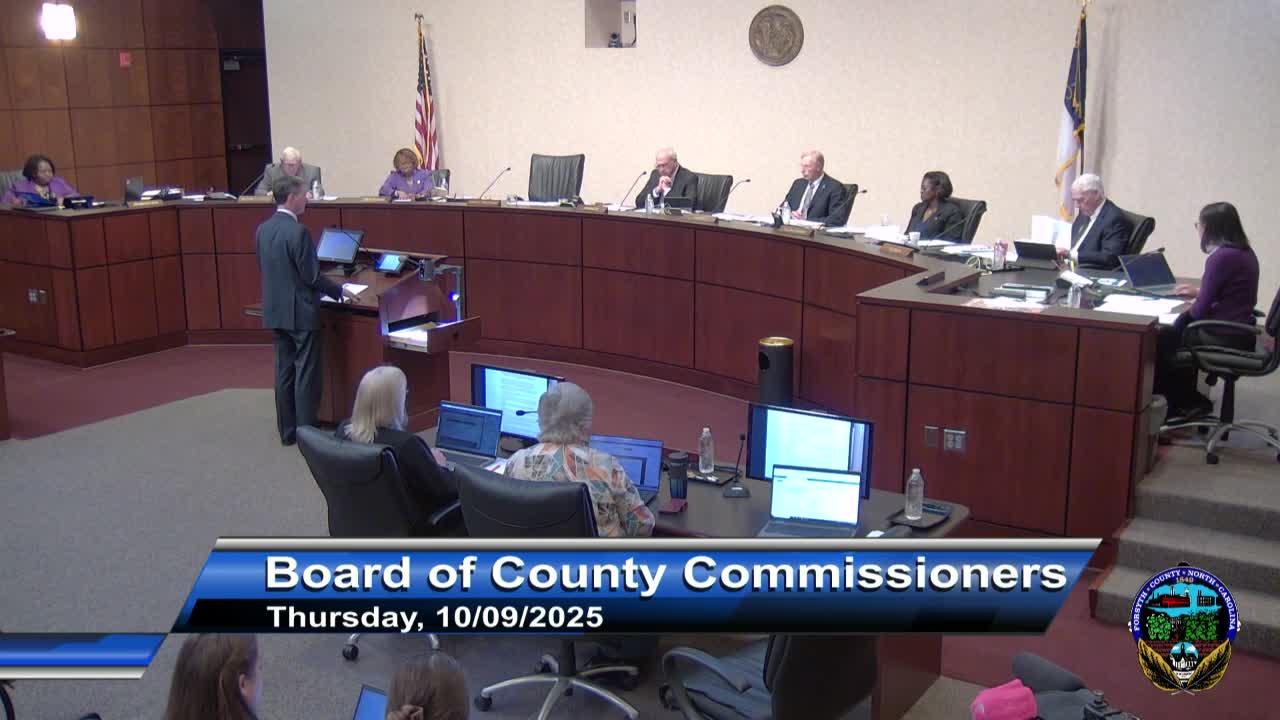Forsyth County commissioners approve conditional forgiveness of up to $5.03 million in school district debt if private funds repay state and other creditors
Get AI-powered insights, summaries, and transcripts
Subscribe
Summary
The Forsyth County Board of Commissioners voted 5-2 on Oct. 9 to conditionally forgive up to $5,026,336.90 of debt owed by Winston‑Salem Forsyth County Schools if privately raised funds first repay the state and other creditors.
FORSYTH COUNTY, N.C. — The Forsyth County Board of Commissioners voted 5-2 on Oct. 9 to conditionally forgive up to $5,026,336.90 in debt the Winston‑Salem Forsyth County Schools (WSFCS) owes the county, provided privately raised funds are used to repay the school system’s outstanding debts to the North Carolina Department of Public Instruction (NCDPI) and other creditors.
The resolution, drafted by county attorneys and reviewed at the meeting, credits the county dollar‑for‑dollar for privately raised repayments first forwarded to NCDPI. The county manager is authorized to verify repayments and notify the board; any county forgiveness must be completed by Dec. 31, 2025, unless the board amends the resolution.
Why it matters: County officials said the county had covered school resource officers and school nurses during fiscal 2024–25 and was not reimbursed. County Manager Kirby Robinson told commissioners the missed reimbursement already reduced the county’s FY25 fund balance and that the action does not require an immediate tax increase.
County attorney Gordon Watkins described the county’s claim as a contractual debt under an interlocal agreement rather than a loan. “It was not a loan,” Watkins said during the presentation, “it’s more equivalent to … payment for services, and is a debt that we can, if we choose, conditionally, forgive based on other actions.”
Mechanics of the plan: The resolution requires WSFCS or any private organization raising funds on its behalf to forward payments “as soon as practicable” to NCDPI to reduce the state debt, and to notify the county manager within five days of each payment and identify the source of funds. After NCDPI confirms repayment, the county will forgive the same dollar amount of the county debt. If privately raised funds exceed the NCDPI debt, remaining funds would be applied to other debts as jointly authorized by the school board and the county commission; the county’s total forgiveness is capped at $5,026,336.90.
Public comments and board debate: Dozens of speakers addressed the issue during the public session. Several speakers urged the commissioners not to forgive the debt without stronger accountability and transparency measures. Alan Daniel said, “The only way to restore and establish accountability is to start with the truth.” Michael Owens and other callers urged the board to consider parity with other debtors and to ensure consistent treatment of county creditors.
Other speakers pressed the board to act to protect school services and staff. Jenny Easter, president of the Forsyth County Association of Educators, said, “Funding this debt isn’t just about fixing a balance sheet, it’s about protecting the human infrastructure of our schools and our children’s educational future.” Supporters argued that private matching could prevent additional classroom cuts and layoffs and might reduce interest costs the school system faces from state overdrafts.
Several commissioners framed the vote as a compromise to avoid deeper cuts required by the state’s repayment demands. Commissioners who supported the resolution emphasized the dollar‑for‑dollar matching requirement, the county manager’s verification role, and the December deadline as guardrails. The motion was made by Commissioner McDaniel and seconded by Commissioner Bessie.
Outcome and next steps: The resolution passed 5-2. The county manager is charged with coordinating verification with WSFCS, NCDPI and other parties and reporting repayments to the board. County staff and the attorney said the forgiveness applies only to the county debt defined in the resolution and does not affect other amounts that WSFCS owes the county.
Context and constraints: Commissioners and staff repeatedly noted limits on local authority. The county manager said current county funding formulas provided WSFCS recurring funding based on property tax growth, not enrollment, and that fund‑balance effects from the unpaid FY25 reimbursement are already reflected in county financial statements. Commissioners and members of the public pressed for stronger auditing and oversight of WSFCS finances; staff noted an independent audit and state reporting obligations are underway.
The board’s action creates a conditional, time‑limited path for private donors to reduce the school system’s state and vendor debts while securing a county offset for those repayments. If privately raised dollars do not materialize before Dec. 31, 2025, no county forgiveness will occur without another vote of the commissioners.
